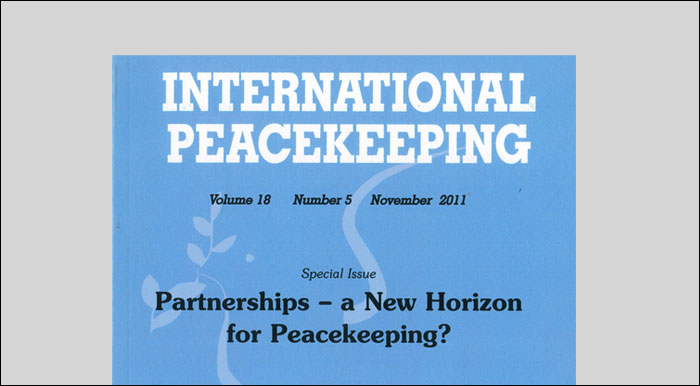 What role do partnerships play in forming a global peacekeeping system that can respond effectively and predictably to today’s security challenges? This special issue of the journal International Peacekeeping addresses the political, strategic, and operational challenges inherent in partnerships and proposes strategies for addressing them.
What role do partnerships play in forming a global peacekeeping system that can respond effectively and predictably to today’s security challenges? This special issue of the journal International Peacekeeping addresses the political, strategic, and operational challenges inherent in partnerships and proposes strategies for addressing them.
The introduction, by IPI Research Fellow Adam C. Smith, provides a summary of the key themes. In the conclusion, IPI’s Senior Director for Research, Francesco Mancini, proposes a framework for making partnerships more manageable.
Contents:
- Introduction [pdf]
- Peacekeeping: The Global Enterprise
Adam C. Smith surveys partnership’s many forms, the problems partnerships are meant to solve, and ways to manage the challenges that partnerships present.
- Partnering for Peace: Implications and Dilemmas
Emily Paddon argues reform efforts should primarily focus on strengthening internal partnerships between UN bodies and member states.
- Partnering for Troop Supply
Donald C.F. Daniel recommends institutionalizing force-generation mechanisms to create standby, high-readiness brigades.
- Partnering to Protect: Conceptualizing Civil–Military Partnerships for the Protection of Civilians
Jim Rolfe proposes a system of pre-mission planning and post-mission evaluation.
- Civilian Peacekeeping Capacity: Mobilizing Partners to Match Supply and Demand
Cedric de Coning recommends that the UN rethink its system for identifying civilian experts.
- From Rapid Reaction to Delayed Inaction? Congo, the UN and the EU
Richard Gowan warns against an overreliance on external actors in this case study of an EU-UN partnership.
- Partnerships and International Policing: The Reach and Limits of Policy Processes
Gordon Peake suggests that rhetorical and technical outreach to a partner cannot make up for genuine political engagement.
- Conclusion [pdf]
- Managing Partnership
Francesco Mancini proposes a framework to help leaders manage partnerships by addressing their structural weaknesses.
More about International Peacekeeping Vol. 18, No. 5 from Taylor & Francis >>







